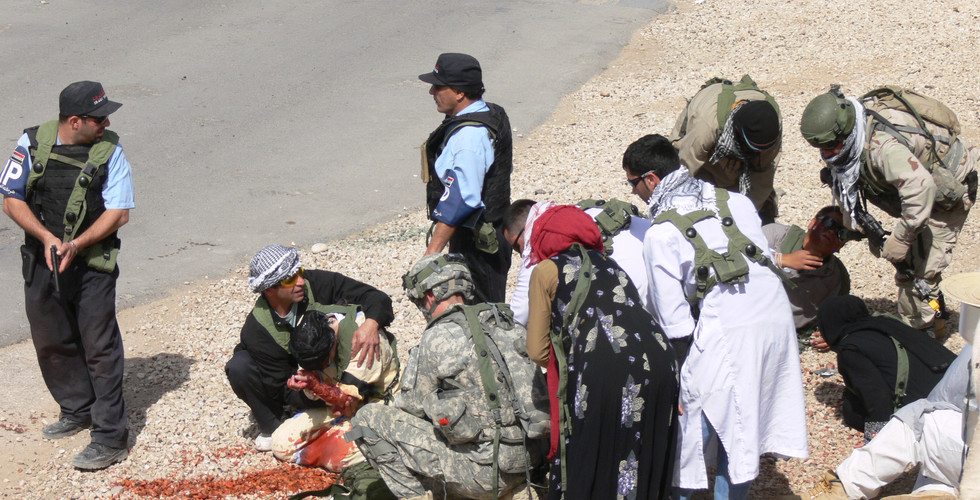In the Box
- Shanghai Brown
.JPG/v1/fill/w_320,h_320/file.jpg)
- Jan 31, 2019
- 3 min read
Some time ago, I was invited to go "In the Box" out at Fort Irwin, to witness Army training for desert warfare. We would spend the afternoon watching a unit from North Carolina go through their first exercise - a patrol into an Iraqi village that comes under fire. This is a "travel" experience that, if you ever get the opportunity, you should do whatever you need to do to take it. It's an experience not easily forgotten.
Before you enter Fort Irwin, you reach this desert rock formation where units have painted their own boulders as informal monuments and memorials. It has the feeling of a revered place for all those who have trained here over the years. We wandered among the boulders while waiting for transportation into the base, and then it was on to the Iraqi village.....
Tension builds in the Iraqi village as the American patrol approaches. Village life tries to continue, but arguments break out and the Iraqi police begin to act as if trouble could erupt at any time. Bill Cook, our tour leader, introduces us to some of the U.S. servicemen who portray casualties in the role playing that's to come. These men have lost arms and legs in combat and now will have faux blood pumping from the stumps of their limbs as the carnage they know all too well is re-enacted during this training exercise.
The entire village is rigged like a movie set, with incredible special effects that can mimic the sound of an incoming RPG, and it's explosion. It's also filled with cameras, and by the next morning, the same troops who underwent this training will watch a video, recapping what they did right - and what they did wrong.
As the arriving troops react to their lead Humvee being blown up by an IED, they face the issue of trying to assist the Army and civilian wounded, while securing the area to prevent further casualties. But as they begin to get a handle on the situation, sniper fire breaks out.
The mayhem continues to build as more sniper fire is followed by an RPG. The unit from North Carolina begins to take the training seriously, and you can feel the stress increasing as they try to get a handle on their situation. One soldier at the far end of the street yells to "get someone the fuck down here," as he realizes he is the only one securing that area. Control of the street is disorganized at best, and a civilian van drives through the area without being checked for explosives. Luckily, it was not a car bomb. This time.
Finally, things in the village are secured. The sniper fire has stopped, the wounded are treated and taken away. Life in the Iraqi village goes back to whatever "normal" is during wartime. The exercise has taken nearly two-and-a-half hours, and the North Carolina unit has taken a beating. I'm told that by the end of their two weeks of training here "in the Box," they'll go through this exercise again, and most units will be able to secure their position in about 20 minutes by then. If going through this saves even one American life when these troops face a similar situation when they're deployed, I can't help but think it's worth it.
The village is impressive with its realism. Most of the Iraqis are played by - Iraqis. I'm told many are the interpreters and contractors who assisted U.S. forces in Iraq and their family members. Most faced death threats made against their families and so they came to America and work in training our troops. There are Sunnis and Shiites and the two don't always get along. We're told that the Sunnis were hoarding water on base and there was nearly a fight between them and the Shiites. The base commander informed them that if they didn't work out their differences they could go back to Iraq. Problem solved.
You can still occasionally join a tour In the Box out at Fort Irwin, but they're rarely given now and they fill up very quickly. Lately there has been some discussion about how expensive this kind of training is, with all the construction and special effects. But how expensive is it to lose half a dozen troops? Or even one soldier? Unless we're hearing from the troops who undergo the training that they believe it doesn't help them, I'm one taxpayer who is more than happy to see my tax money going toward anything that helps them come home from their deployments. I think we owe that to them - and to their loved ones.








































































































































































































































































Comments